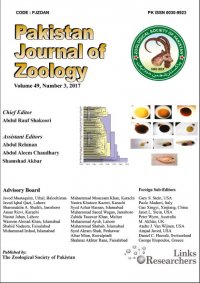The threatened (endangered) carp, Botia dario (Hamilton, 1822), is an important, nutritionally valuable food fish in south Asian countries i.e., Bangladesh, Bhutan, India and Nepal.The present study describes the first complete, inclusive description on life-history traits of B. dario, including ─ sex ratio, length-frequency distributions (LFDs), length-weight relationships (LWRs), length-length relationships (LLRs), condition factors (allometric, KA; Fulton’s, KF; relative, KR), relative weight (WR), form factor (a3.0), size at first sexual maturity (Lm) and natural mortality (MW) in the Ganges River, northwestern (NW) Bangladesh. Samples were collected occasionally using multiples traditional fishing gears, including cast net (mesh size 1.5 – 2.0 cm), square lift net (mesh size ~1.5) and gill net (mesh size 1.8 – 2.2 cm) from July 2013 to June 2014. A total of 142 individuals of B. dario were collected, where 42.0% were males and 58.0% were females. The overall sex ratio did not differ significantly from the expected 1:1 ratio (χ2 = 4.06, p > 0.05). Total length was varied from 5.59 to 12.87 cm and body weight ranged from 3.40 to 27.87 g. All LWRs were highly significant (p < 0.001), with all r2values exceeding 0.97. The calculated allometric coefficient (b) indicated negative allometric growth in male, female, and combined sexes (b < 3.00, p < 0.001). All LLRs were highly significant (p < 0.001), with coefficients of determination (r2) values exceeded 0.98. Among the condition factors, KF is the best index for assessing the well-being of this species in the Ganges River. The WR was not significantly different from 100 for males (p = 0.298) and females (p = 0.650), indicating that habitat was still in good condition. Thecalculated a3.0 were 0.0120 and 0.0103 for male and female,respectively. The Lm for male and female B. dario were 7.32 cm and 7.90 cm in TL, respectively. Moreover, MW for this population was estimated as 1.09 y-1 in the Ganges River, NW Bangladesh. The findings of this study would be very effective for the sustainable management of this threatened carp in Bangladesh and also neighboring countries.









